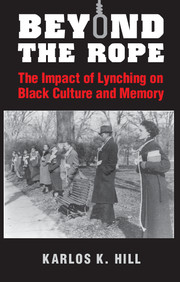2 - Resisting Lynching
Published online by Cambridge University Press: 05 July 2016
Summary
This chapter explores why and how black Americans constructed victimization narratives of the lynched black body in response to the racialization of lynching. Victimization narratives of the lynched black body framed potential and actual black lynch victims as hapless, dehumanized sufferers of white-on-black lynch mob violence. Black-authored victimization narratives of the lynched black body offered a counterpoint to white-authored lynching narratives that framed black lynch victims as black beast rapists or brutes. In response to the latter rhetorical context, black-authored victimization narratives sought to transform how white Americans understood black lynch victims, mobilize black communities and authorities to prevent lynchings in the making, and compel white audiences to support vigorous federal antilynching legislation.
In order to illustrate these themes, this chapter tells the stories of Steve Green's and Henry Lowery's antilynching defense campaigns. Unlike the majority of African Americans whose lives were threatened by white lynch mob violence, in both Green's and Lowery's cases, African American communities beyond the locale of the precipitating event organized vigorous defense campaigns to save the men from all-but-certain lynchings if they were returned to the communities in which their alleged crimes had occurred. The chapter's first section details Steve Green's story. In March 1910, Steve Green, a black tenant farmer, allegedly murdered a white plantation owner, William Sidle, in cold blood in Jericho, Arkansas. Green fled Arkansas with the help of friends and relatives but was later apprehended in Chicago. My analysis of Steve Green's defense campaign will emphasize how the victimization narrative of the lynched black body compelled Chicago's black community and local authorities to prevent Green's extradition to Arkansas. The chapter's second section analyzes Henry Lowery's story. Approximately ten years after Steve Green's near extradition, in December 1921, Henry Lowery, also a black tenant farmer, was accused of murdering white planter O. T. Craig and his daughter on Christmas Day in Nodena, Arkansas. Like Green, Lowery fled with the aid of black social networks but was later captured by Arkansas authorities in El Paso, Texas. Although Henry Lowery initially alluded Arkansas authorities, he was extradited to Arkansas and lynched upon his return. In response to Henry Lowery's lynching, the NAACP mobilized a national and international publicity campaign aimed at highlighting how white lynch mob violence was brutalizing black Americans.
- Type
- Chapter
- Information
- Beyond the RopeThe Impact of Lynching on Black Culture and Memory, pp. 39 - 68Publisher: Cambridge University PressPrint publication year: 2016



